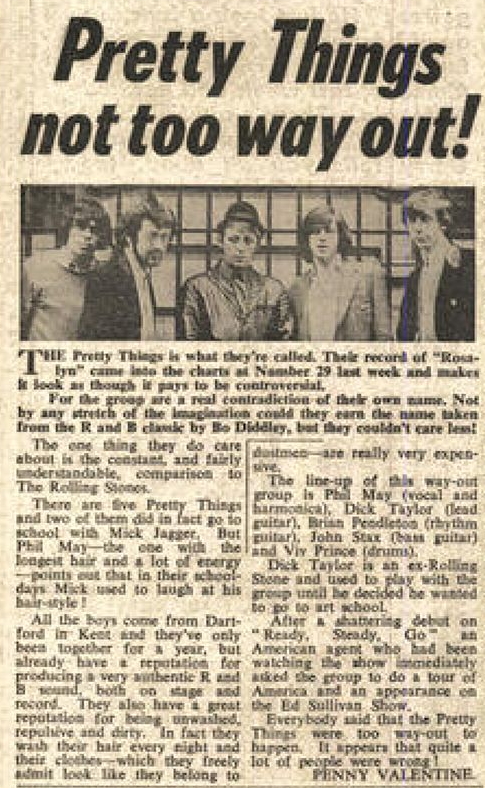Cet article de Penny Valentine est paru dans le numéro 326 de l’hebdomadaire britannique Disc, daté du 20 juin 1964. Cette brève présentation des Pretty Things précise que malgré les apparences, ils se lavent les cheveux tous les jours et portent des habits très coûteux. Leur réputation de sauvageons n’a pas eu d’effet négatif sur le succès de leur premier single, Rosalyn, sorti quelques semaines plus tôt.

Transcription
The Pretty Things is what they’re called. Their record of “Rosalyn” came into the charts at Number 29 last week and makes it look as though it pays to be controversial.
For the group are a real contradiction of their own name. Not by any stretch of the imagination could they earn the name taken from the R and B classic by Bo Diddley, but they couldn’t care less!
The one thing they do care about is the constant, and fairly understandable, comparison to The Rolling Stones.
There are five Pretty Things and two of them did in fact go to school with Mick Jagger. But Phil May—the one with the longest hair and a lot of energy—points out that in their schooldays Mick used to laugh at his hair-style!
All the boys come from Dartford in Kent and they’ve only been together for a year, but already have a reputation for producing a very authentic R and B sound, both on stage and record. They also have a great reputation for being unwashed, repulsive and dirty. In fact they wash their hair every night and their clothes—which they freely admit look like they belong to dustmen—are really very expensive.
The line-up of this way-out group is Phil May (vocal and harmonica), Dick Taylor (lead guitar), Brian Pendleton (rhythm guitar), John Stax (bass guitar) and Viv Prince (drums).
Dick Taylor is an ex-Rolling Stone and used to play with the group until he decided he wanted to go to art school.
After a shattering debut on “Ready, Steady, Go” an American agent who had been watching the show immediately asked the group to do a tour of America and an appearance on the Ed Sullivan Show.
Everybody said that the Pretty Things were too way-out to happen. It appears that quite a lot of people were wrong!
Source : worldradiohistory.com (PDF).